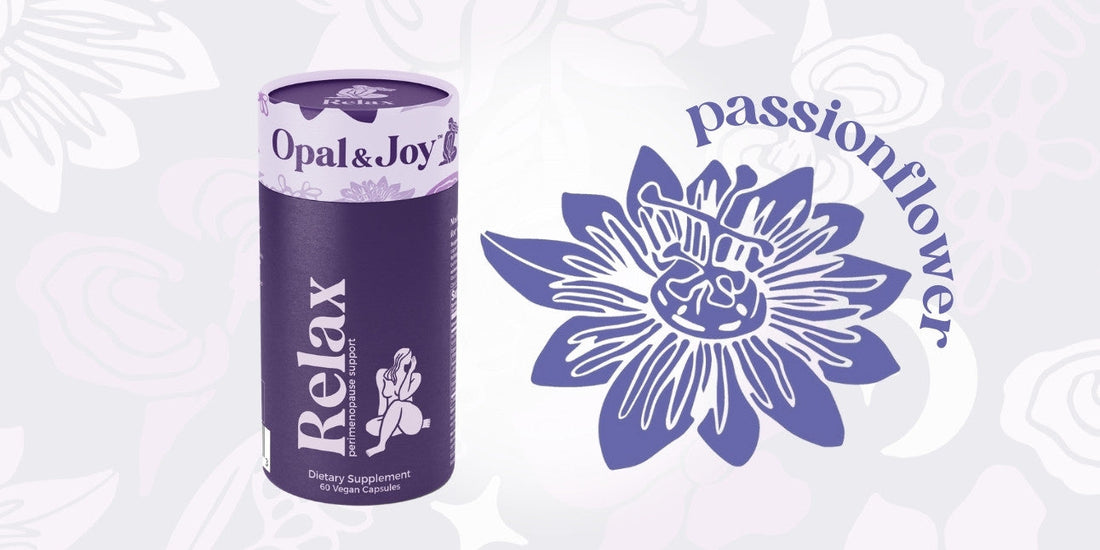
Benefits of Passionflower for Perimenopause Sleep Support
At Opal & Joy, we make sure we use only the very best high-quality, clean ingredients to make our products, including the passionflower we use in our Relax sleep support product as part of our Restorative Sleep System. But what, you may be asking, is passionflower? In this article, we'll examine the benefits of passionflower for perimenopause sleep support.
What is Passionflower?
Passionflower (Passiflora incarnata) is a climbing vine native to southeastern North America. It has been used for centuries in traditional medicine for its calming and sleep-promoting properties. The plant gets its name from its unique and beautiful flowers, which were thought to symbolize the passion of Christ by early Spanish missionaries.
How Does Passionflower Help with Perimenopausal Sleep Issues?
Perimenopause can bring a host of sleep-disrupting symptoms, including hot flashes, night sweats, and anxiety. Here's how passionflower might help:
Promotes Relaxation and Reduces Anxiety
Passionflower has been found to increase levels of gamma-aminobutyric acid (GABA) in the brain. GABA is a neurotransmitter that promotes relaxation and reduces anxiety. During perimenopause, GABA levels can decrease, contributing to feelings of anxiety and sleeplessness. By boosting GABA, passionflower may help create a more relaxed state conducive to sleep.
Improves Sleep Quality
Research suggests that passionflower can improve overall sleep quality. A study published in Phytotherapy Research found that passionflower tea, when consumed before bedtime, led to significantly better sleep quality in adults with mild sleep problems.
Addresses Hot Flashes and Night Sweats
Some studies indicate that passionflower may help alleviate vasomotor symptoms like hot flashes and night sweats. These symptoms are common culprits behind sleep disturbances during perimenopause.
Mood Regulation
Perimenopause often comes with mood swings and irritability, which can interfere with sleep. Passionflower has been shown to have mood-regulating effects, potentially helping to create a more stable emotional state conducive to better sleep.
Potential Benefits of Passionflower Beyond Sleep
While improved sleep is a primary benefit, passionflower may offer additional perks for perimenopausal women:
Anxiety Relief
Studies have shown that passionflower can have anxiety-relieving effects similar to some prescription medications, but without as many side effects.
Menopausal Symptom Relief
Some research suggests that passionflower may help alleviate other menopausal symptoms such as headaches and depression.
The Science Behind Passionflower
Passionflower's effects on sleep and anxiety are believed to be due to several compounds it contains:
- Flavonoids: These antioxidants may contribute to passionflower's calming effects.
- Alkaloids: Some alkaloids in passionflower may have mild sedative properties.
- GABA: As mentioned earlier, passionflower can increase GABA levels in the brain, promoting relaxation.
Passionflower offers a natural, gentle approach to addressing sleep issues during perimenopause. Its ability to promote relaxation, improve sleep quality and potentially alleviate other perimenopausal symptoms is the reason we use it in our Rest sleep support product as part of our Restorative Sleep System.
While more research is needed, particularly on its long-term use for perimenopausal symptoms, the current evidence suggests that passionflower could be a promising natural aid for sleep and relaxation during this transitional phase.
Remember, every woman's experience of perimenopause is unique, and what works for one may not work for another. It's always best to approach any new supplement or treatment with caution and under the guidance of a healthcare professional.
This content is for educational purposes only and is not medical advice.

